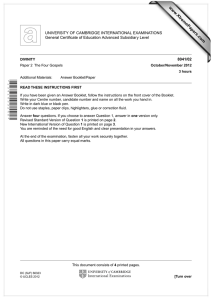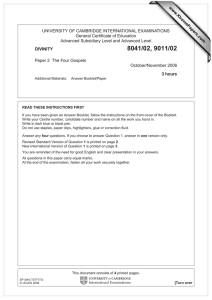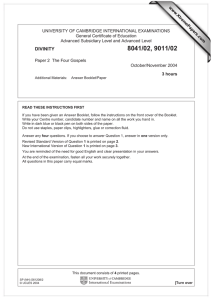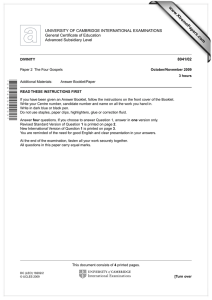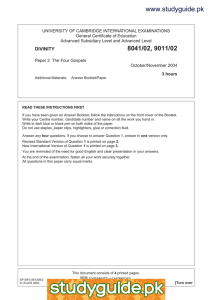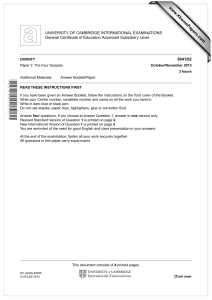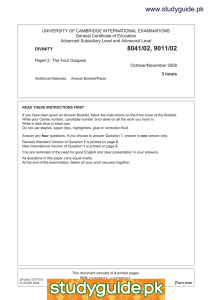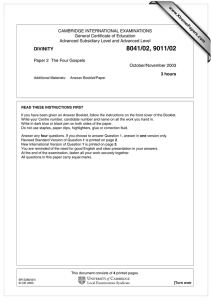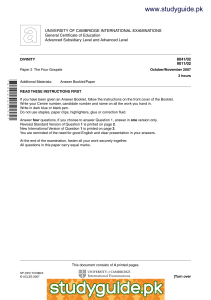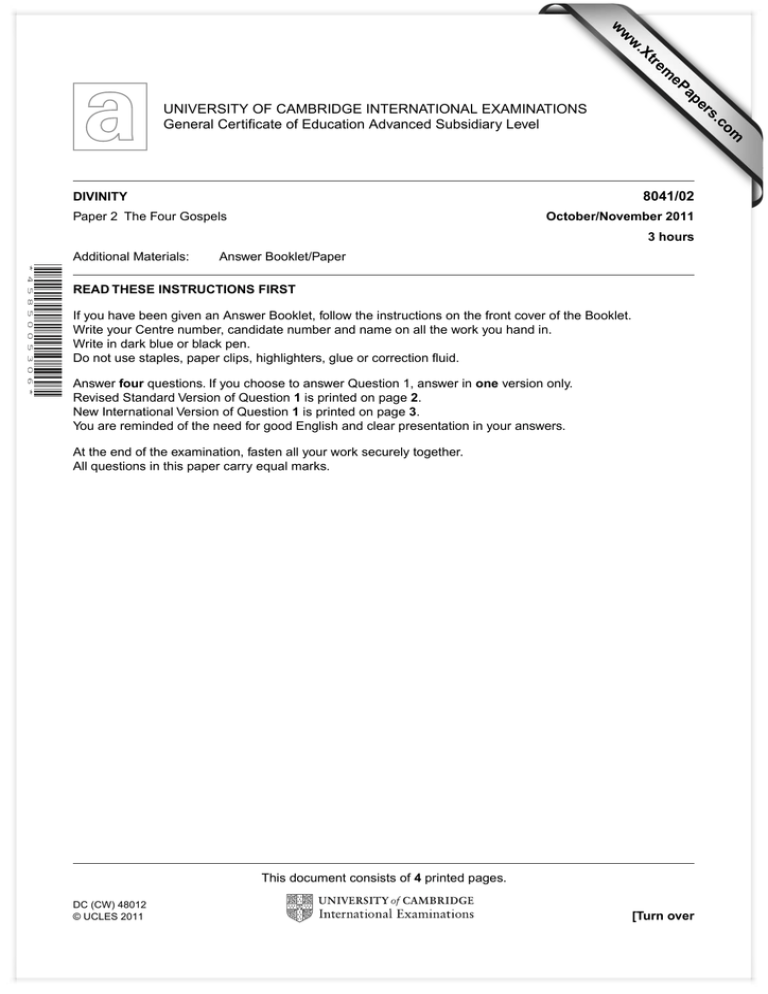
w
w
ap
eP
m
e
tr
.X
w
om
.c
s
er
UNIVERSITY OF CAMBRIDGE INTERNATIONAL EXAMINATIONS
General Certificate of Education Advanced Subsidiary Level
8041/02
DIVINITY
Paper 2 The Four Gospels
October/November 2011
3 hours
Additional Materials:
Answer Booklet/Paper
* 4 5 8 5 0 0 5 3 0 6 *
READ THESE INSTRUCTIONS FIRST
If you have been given an Answer Booklet, follow the instructions on the front cover of the Booklet.
Write your Centre number, candidate number and name on all the work you hand in.
Write in dark blue or black pen.
Do not use staples, paper clips, highlighters, glue or correction fluid.
Answer four questions. If you choose to answer Question 1, answer in one version only.
Revised Standard Version of Question 1 is printed on page 2.
New International Version of Question 1 is printed on page 3.
You are reminded of the need for good English and clear presentation in your answers.
At the end of the examination, fasten all your work securely together.
All questions in this paper carry equal marks.
This document consists of 4 printed pages.
DC (CW) 48012
© UCLES 2011
[Turn over
2
REVISED STANDARD VERSION
1
Comment on points of interest or difficulty in four of the following passages (wherever possible
answers should refer to the context of the passage but should not retell the story from which the
passage is taken).
[25 marks]
(a) And in praying do not heap up empty phrases as the Gentiles do; for they think that they will
be heard for their many words.
(Matthew 6:7)
(b) The kingdom of heaven is like treasure hidden in a field, which a man found and covered up;
then in his joy he goes and sells all that he has and buys that field.
(Matthew 13:44)
(c) And he replied, “Who are my mother and my brothers?” And looking around on those who sat
about him, he said, “Here are my mother and my brothers!”
(Mark 3:33–34)
(d) But the woman, knowing what had been done to her, came in fear and trembling and fell
down before him, and told him the whole truth.
(Mark 5:33)
(e) And Jesus, full of the Holy Spirit, returned from the Jordan, and was led by the Spirit for forty
days in the wilderness, tempted by the devil. And he ate nothing in those days; and when they
were ended, he was hungry.
(Luke 4:1–2)
(f)
And when he learned that he belonged to Herod’s jurisdiction, he sent him over to Herod, who
was himself in Jerusalem at that time.
(Luke 23:7)
(g) He who eats my flesh and drinks my blood abides in me, and I in him.
(John 6:56)
(h) Every branch of mine that bears no fruit, he takes away, and every branch that does bear fruit
he prunes that it may bear more fruit.
(John 15:2)
© UCLES 2011
8041/02/O/N/11
3
NEW INTERNATIONAL VERSION
1
Comment on points of interest or difficulty in four of the following passages (wherever possible
answers should refer to the context of the passage but should not retell the story from which the
passage is taken).
[25 marks]
(a) And when you pray, do not keep on babbling like pagans, for they think they will be heard
because of their many words.
(Matthew 6:7)
(b) The kingdom of heaven is like treasure hidden in a field. When a man found it, he hid it again,
and then in his joy went and sold all he had and bought that field.
(Matthew 13:44)
(c) “Who are my mother and my brothers?” he asked. Then he looked at those seated in a circle
around him and said, “Here are my mother and my brothers!”
(Mark 3:33–34)
(d) Then the woman, knowing what had happened to her, came and fell at his feet and, trembling
with fear, told him the whole truth.
(Mark 5:33)
(e) Jesus, full of the Holy Spirit, returned from the Jordan and was led by the Spirit in the desert,
where for forty days he was tempted by the devil. He ate nothing during those days, and at
the end of them he was hungry.
(Luke 4:1–2)
(f)
When he learned that Jesus was under Herod’s jurisdiction, he sent him to Herod, who was
also in Jerusalem at that time.
(Luke 23:7)
(g) Whoever eats my flesh and drinks my blood remains in me, and I in him.
(John 6:56)
(h) He cuts off every branch in me that bears no fruit, while every branch that does bear fruit he
prunes so that it will be even more fruitful.
(John 15:2)
© UCLES 2011
8041/02/O/N/11
[Turn over
4
2
To what extent can it be said that Matthew’s birth narrative (chapters 1 and 2) sets the scene for
the rest of the gospel?
[25]
3
“Matthew’s gospel aims to show the beginning of the Christian Church.” Discuss this view.
[25]
4
When, where and by whom was Mark’s gospel written?
[25]
5
Examine the significance for Mark’s gospel of the accounts of the confession of Peter at Caesarea
Philippi and the transfiguration of Jesus.
[25]
6
Examine and assess the way Luke used sources in writing his gospel.
[25]
7
“Luke presents Jesus as having extraordinary powers.” Discuss.
[25]
8
Assess the role of John the Baptist in John’s gospel.
[25]
9
Why was John’s gospel written?
[25]
10 What are the significant features of Jesus’ teaching on discipleship?
[25]
11 To what extent do the gospels portray Jesus as breaking the laws of the sabbath?
[25]
12 In what ways do the gospels show Jesus fulfilling the role of the suffering servant in Isaiah?
[25]
13 Discuss the difficulties that arise from the gospel accounts of Jesus’ resurrection.
[25]
14 Assess the view that the gospel texts can only be properly understood in the context of the political,
social and religious situation of first century Palestine.
[25]
Copyright Acknowledgements:
Scripture quotations marked (RSV) are from the Revised Standard Version of the Bible, copyright © 1946, 1952 and 1971 by the Division of Christian Education
of the National Council of the Churches of Christ in the USA. Used by permission. All rights reserved.
Scripture quotations marked (NIV) are taken from the Holy Bible, New International Version®. NIV®. Copyright © 1973, 1978, 1984 by International Bible Society.
Used by permission. All rights reserved.
Permission to reproduce items where third-party owned material protected by copyright is included has been sought and cleared where possible. Every reasonable
effort has been made by the publisher (UCLES) to trace copyright holders, but if any items requiring clearance have unwittingly been included, the publisher will
be pleased to make amends at the earliest possible opportunity.
University of Cambridge International Examinations is part of the Cambridge Assessment Group. Cambridge Assessment is the brand name of University of
Cambridge Local Examinations Syndicate (UCLES), which is itself a department of the University of Cambridge.
© UCLES 2011
8041/02/O/N/11


